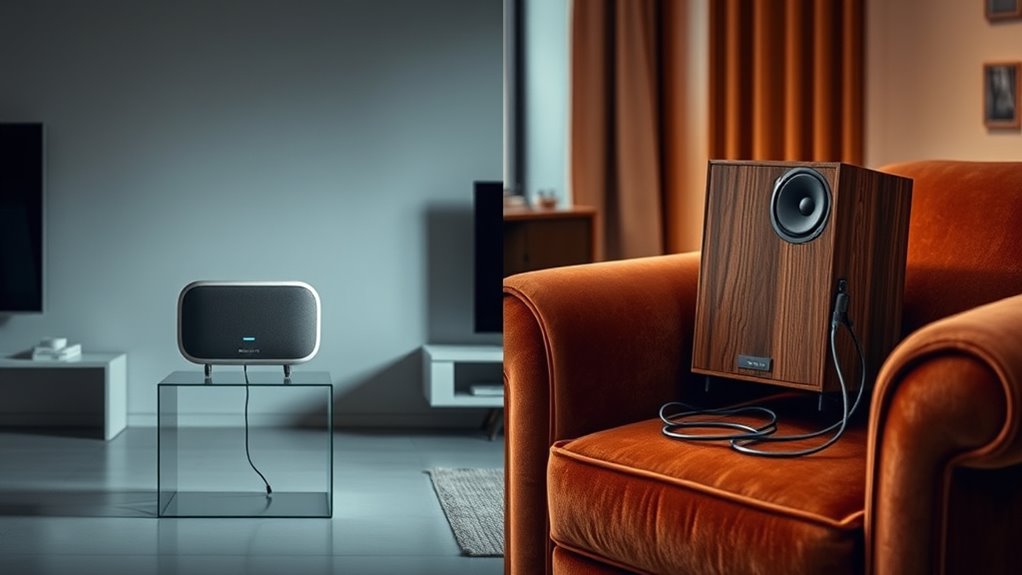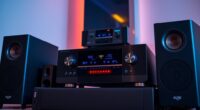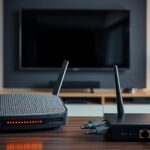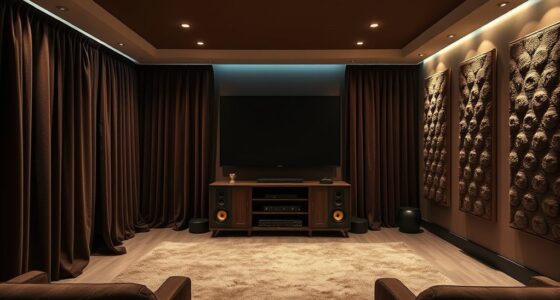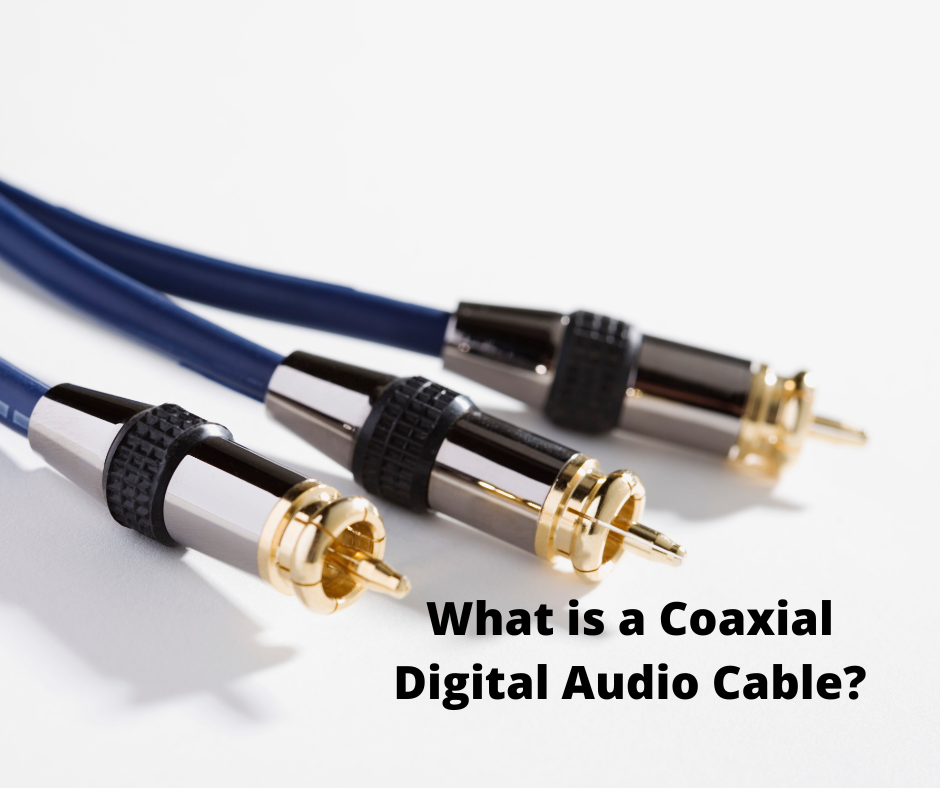Choosing between wireless and wired speakers depends on what you value most. If you want top audio quality and a stable connection, wired speakers are the best choice, though they can be tricky to install. If you prefer convenience and flexibility, wireless speakers let you move and set up easily, but they might occasionally face connection issues. To find out which option suits your needs perfectly, explore the details below.
Key Takeaways
- Wired speakers offer superior sound quality and stability, ideal for high-fidelity audio and complex setups.
- Wireless speakers provide easy installation and flexibility, perfect for quick setups and multi-room use.
- Wired systems are more reliable long-term, with fewer connection issues, while wireless options may need regular troubleshooting.
- Wired speakers require cable management and more effort during installation; wireless models are portable and clutter-free.
- Choose wired for premium sound and stability; opt for wireless for convenience, aesthetics, and easy reconfiguration.
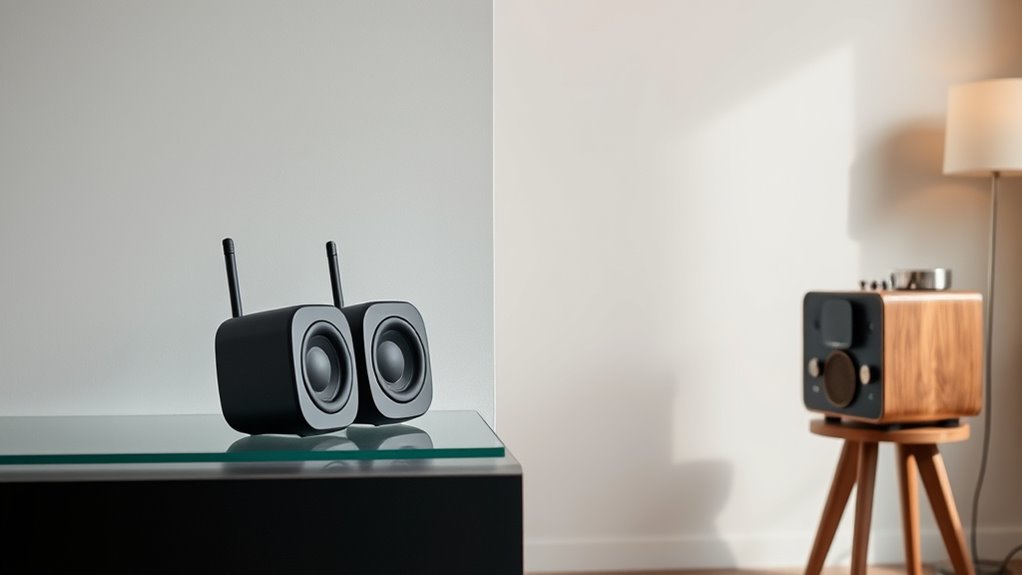
When choosing between wireless and wired speakers, understanding their key differences can help you make an informed decision. One of the most important factors to consider is audio quality. Wired speakers traditionally offer superior sound clarity because the audio signal travels directly through a physical connection, minimizing interference and signal loss. If you’re an audiophile or someone who values pristine sound, wired options often provide a more consistent and high-fidelity experience. Wireless speakers, on the other hand, have improved considerably over recent years, but they can still be susceptible to interference from Wi-Fi networks, Bluetooth congestion, or other electronic devices. While many high-end wireless models deliver impressive audio quality, they might not match the perfection of wired systems, especially at higher volumes or in complex audio setups.
Wired speakers offer superior sound clarity and consistency compared to wireless options.
Another vital aspect to weigh is installation complexity. Wired speakers require a bit more effort upfront because you’ll need to run cables from your audio source to each speaker. This can involve drilling holes, hiding wires behind furniture, or managing cable clutter, which might be a hassle if you’re trying to keep your space tidy or if you’re not comfortable with DIY projects. However, once installed, wired speakers tend to be more stable—they don’t depend on a Wi-Fi or Bluetooth connection, so you won’t have to worry about dropped signals or pairing issues. Wireless speakers, by contrast, are designed for easy setup. You usually just connect them to your Wi-Fi network or pair via Bluetooth, and you’re ready to go. This makes wireless options appealing if you want a quick, clutter-free solution or plan to move the speakers around frequently.
However, keep in mind that wireless setups can introduce their own challenges. They may require a stable Wi-Fi connection, and some models need regular updates or troubleshooting to maintain peak performance. Battery-powered wireless speakers also need recharging or battery replacement, which adds another layer of maintenance. Wired speakers, while more involved initially, tend to be more reliable over time because they don’t depend on wireless signals or batteries. Additionally, the contrast ratio of a projector can influence how vivid and dynamic your visual experience is, which is an important consideration for home cinema setups.
Ultimately, your choice hinges on your priorities. If you’re after the highest possible audio quality and don’t mind a more complex installation process, wired speakers are likely the better fit. But if you prefer convenience, flexibility, and a cleaner look, wireless options might suit you more—just be prepared for potential compromises in sound fidelity and the need for a good Wi-Fi connection.
Frequently Asked Questions
Can Wireless Speakers Work Without Wi-Fi or Bluetooth?
Wireless speakers generally need Wi-Fi or Bluetooth to work, so they can’t operate without these connections. However, some portable wireless speakers use a built-in battery and can connect via NFC or auxiliary cables, bypassing Wi-Fi or Bluetooth. Keep in mind, their battery dependency limits usage time, and signal limitations can affect sound quality or connection stability. If you want hassle-free playback without relying on Wi-Fi or Bluetooth, wired speakers might be a better choice.
Are Wired Speakers More Durable Than Wireless Options?
Wired speakers generally offer more durability than wireless options, thanks to their material resilience and simpler design. You’ll find that they’re less prone to damage from drops or environmental factors since they lack delicate internal batteries and antennas. Their sturdy construction means they often last longer with minimal maintenance. If you prioritize durability and resilience, wired speakers are a reliable choice, especially for heavy use or outdoor settings.
Do Wireless Speakers Have Latency Issues During Video Playback?
You might notice some latency issues with wireless speakers during video playback, causing audio to fall out of sync with the picture—like watching a movie with a tiny echo delay. While modern wireless tech has improved, slight delays can still occur, affecting video synchronization. If perfect sync matters most, wired speakers usually offer more reliable, lag-free performance, ensuring your audio matches every scene seamlessly.
Is There a Significant Sound Quality Difference Between Wired and Wireless Speakers?
You might notice a slight difference in audio fidelity between wired and wireless speakers, but it’s often minimal with modern technology. Wired speakers typically offer a more stable signal, reducing the risk of signal interference that can affect sound quality. Wireless speakers have improved greatly, but they can still experience minor interference, which may impact sound clarity. Overall, if pristine sound is your priority, wired usually provides the best quality.
How Easy Is It to Upgrade or Replace Wired Speakers?
You’ll find upgrading or replacing wired speakers quite straightforward, especially since installation flexibility allows you to position them easily. When it comes to maintenance requirements, wired speakers typically need minimal upkeep, making upgrades smooth. Coincidentally, the same ease of replacement applies whether you’re swapping out outdated models or upgrading for better sound. So, you can enjoy a hassle-free process that fits seamlessly into your setup, with minimal fuss.
Conclusion
Ultimately, choosing between wireless and wired speakers depends on your lifestyle and preferences. Did you know that wireless speakers have seen a 25% increase in popularity over the past three years? If you value portability and convenience, wireless options are perfect. But if you prioritize audio fidelity and stability, wired speakers might be better for you. Consider your space and needs carefully—either way, you’ll enjoy great sound tailored to your lifestyle.
